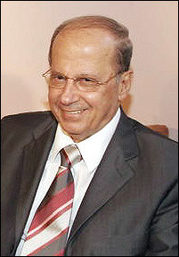 By Lin Noueihed, RABIEH, Lebanon, (Reuters) – Lebanese Christian opposition leader Michel Aoun said on Thursday the government should resign if it was unable to end a political crisis that has paralysed decision-making. Aoun, who heads a major parliamentary bloc but did not join a cabinet formed after Syria withdrew from Lebanon in April, called for early elections as a prelude to replacing pro-Syrian President Emile Lahoud, who has been under pressure to resign.
By Lin Noueihed, RABIEH, Lebanon, (Reuters) – Lebanese Christian opposition leader Michel Aoun said on Thursday the government should resign if it was unable to end a political crisis that has paralysed decision-making. Aoun, who heads a major parliamentary bloc but did not join a cabinet formed after Syria withdrew from Lebanon in April, called for early elections as a prelude to replacing pro-Syrian President Emile Lahoud, who has been under pressure to resign.
They have not formally resigned but their boycott has made it impossible for the cabinet to function. Several efforts to negotiate the return of the Shi’ite ministers, loyal to the Hizbollah group and its Amal allies, have so far faltered over whether it could be considered a militia, but resignation also looks unlikely. The U.N. Security Council put fresh pressure on Lebanon on Monday to disarm Hizbollah, which is backed by Syria and Iran, in line with resolution 1559 adopted in September 2004. A council statement also urged Lebanon to conduct free and fair presidential elections without outside interference. Lebanon extended Lahoud’s term by three years in 2004, a move many anti-Syrian politicians say was made under Syrian pressure. NEW POLLS? Aoun, who won the election by a landslide in the Maronite Christian heartland and sees himself as a future president, called for dialogue "at official level" over Hizbollah’s weapons and fresh parliamentary elections before a presidential vote. "Either they hold elections and implement laws to correct the laws that led to this parliament or, if they do not want new elections, they should take into account the real representative political forces," he said. "If they want to change the president, we can reach an understanding with them on changing the president." In Lebanon’s confessional system, the presidency is reserved for a Maronite who is elected by parliament. The assembly is now dominated by Aoun’s political foes, many of whom would prefer to keep Lahoud in place than give Aoun the job. The last elections were held weeks after Syria ended its 29-year military presence , but according to a law drawn up under Syrian tutelage. Maronites complained at the time that the law was skewed against them and Aoun believes his followers won their seats despite the law not because of it. A former army commander, Aoun lost a battle with Syrian troops at the end of Lebanon’s 1975-1990 civil war and fled to France where he remained for 14 years. He returned after the Syrian withdrawal but has since fallen out with his erstwhile anti-Syrian allies, running against their dominant slates in the polls and accusing them of corruption.



